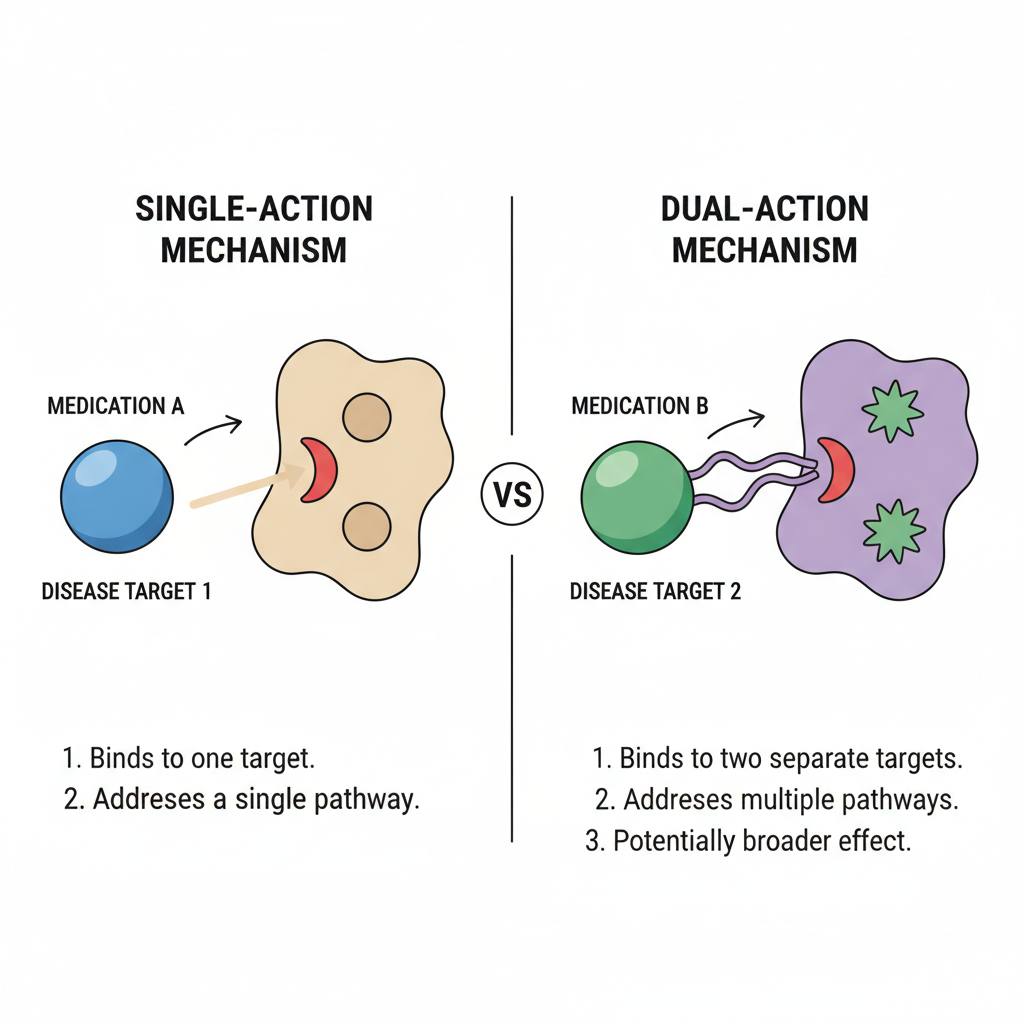Picture this: you’re scrolling through your social media feed, and suddenly everyone’s talking about these miracle weight loss drugs. Your neighbor dropped 30 pounds, your coworker can’t stop raving about her results, and even your doctor’s bringing them up. Welcome to the world of Semaglutide vs Mounjaro – the heavyweight champions of modern weight management.
But here’s the million-dollar question that’s probably keeping you up at night: which one’s actually better for you? I’ve been diving deep into this rabbit hole, and trust me, the answer isn’t as straightforward as you might think.
What Exactly Is Semaglutide?
Let’s start with the basics, shall we? Semaglutide – you might know it better by its brand names Ozempic or Wegovy – is like having a personal appetite coach living in your bloodstream. This injectable medication mimics a hormone called GLP-1, which basically tells your brain, “Hey, we’re good on food right now.”
Originally designed for diabetes management, semaglutide became the unexpected hero of weight loss when doctors noticed their diabetic patients were shedding pounds like nobody’s business. The FDA caught on and approved it specifically for weight management in 2021.
Here’s how semaglutide works its magic:
- Slows down your stomach emptying (so you feel full longer)
- Reduces those nagging hunger pangs
- Helps regulate blood sugar levels
- Targets areas in your brain that control appetite
So What’s Mounjaro Bringing to the Table?
Now, Mounjaro (tirzepatide) is the newer kid on the block – and honestly? It’s been making some serious waves. If semaglutide is like having one really good personal trainer, Mounjaro is like having an entire fitness dream team.
This injectable medication works on two hormone pathways instead of just one. It targets both GLP-1 and GIP receptors, which means it’s pulling double duty on appetite control and blood sugar management. The difference between semaglutide and Mounjaro lies in this dual-action approach.
Mounjaro’s unique selling points:
- Dual hormone pathway targeting
- Often shows more dramatic weight loss results
- Also helps with insulin sensitivity
- Newer formulation with potentially better outcomes

The Effectiveness Showdown: Which Packs More Punch?
Alright, let’s get to the good stuff – the numbers that actually matter to you. When it comes to semaglutide vs Mounjaro for weight loss, the research tells a pretty compelling story.
Semaglutide Results:
Clinical trials show people typically lose 15-20% of their body weight over 68 weeks. That means if you’re starting at 200 pounds, you could potentially drop 30-40 pounds. Not too shabby, right?
Mounjaro Results:
Here’s where things get interesting. Recent studies suggest Mounjaro might have a slight edge, with participants losing up to 22.5% of their body weight. Some people are seeing even more dramatic results – we’re talking 50+ pounds for someone starting at 250 pounds.
| Medication | Average Weight Loss | Time Frame | Success Rate |
|---|---|---|---|
| Semaglutide | 15-20% | 68 weeks | 85% achieve 5%+ loss |
| Mounjaro | 20-22.5% | 72 weeks | 90% achieve 5%+ loss |
Side Effects: The Not-So-Fun Part
Look, I’m not going to sugarcoat this – both medications come with their fair share of side effects. It’s like that friend who gives amazing advice but talks your ear off in the process.
Common Side Effects (Both Medications):
- Nausea (especially during the first few weeks)
- Vomiting
- Diarrhea
- Constipation
- Stomach pain
- Fatigue
The real talk? Most people experience these issues during the initial adjustment period. Your body typically adapts after 4-8 weeks, but some folks might deal with ongoing digestive issues.
Mounjaro vs semaglutide side effects: Mounjaro users report slightly more digestive upset initially, but potentially better tolerance long-term. It’s like choosing between a bumpy start with a smooth finish versus a more consistent (but still present) level of side effects.
Let’s Talk Money: Cost Comparison
Here’s where things get a bit painful for your wallet. Both medications are expensive – we’re talking luxury car payment expensive.
Without insurance:
- Semaglutide: $1,200-$1,400 per month
- Mounjaro: $1,000-$1,200 per month
With insurance: This varies wildly depending on your plan. Some lucky folks pay $25-$50 per month, while others might still shell out $300-$500. It’s basically a insurance lottery.
Money-saving tip: Both manufacturers offer savings programs that can significantly reduce costs, especially if you’re just starting out.
Learn more about Weight loss with and without insurance here.
Is Semaglutide The Same As Mounjaro?
This is where it gets personal, and honestly, there’s no one-size-fits-all answer. Is Mounjaro semaglutide? No – they’re different medications with different mechanisms, though they’re in the same family.
Choose Semaglutide If:
- You want the more established track record
- You’re dealing with diabetes alongside weight management
- You prefer starting with the “tried and true” option
- Cost is a major factor (sometimes covered better by insurance)
Choose Mounjaro If:
- You’re looking for potentially more dramatic results
- You want the latest and greatest technology
- You’re willing to deal with possibly more initial side effects
- Your doctor thinks the dual-action approach suits your needs better
The Reality Check
Here’s something most articles won’t tell you: success with either medication depends heavily on lifestyle changes too. These aren’t magic bullets – they’re powerful tools that work best when combined with healthy eating and regular movement.
What the Experts Are Saying
I recently spoke with several healthcare providers, and the consensus is pretty clear: both medications are game-changers, but the choice should be individualized. According to WebMD, the decision often comes down to your specific health profile, insurance coverage, and how you respond to the initial doses.
One endocrinologist told me, “I’ve seen incredible results with both. The key is finding the right fit for each patient and supporting them through the adjustment period.”
Your Next Steps
So, what’s the bottom line in this semaglutide vs Mounjaro debate? Both medications offer real hope for sustainable weight loss, but they’re not decisions you should make alone or based on social media success stories.
Find more about Ozempic vs Wegovy vs Mounjaro and the Difference between them.
Here’s your action plan:
- Schedule a consultation with a healthcare provider experienced in weight management
- Discuss your medical history, current medications, and weight loss goals
- Review your insurance coverage for both options
- Consider starting with a trial period to see how your body responds
- Prepare for lifestyle changes that will maximize your results
Both medications belong to the GLP-1 class but work slightly differently in the body. The broader context of GLP-1 medications includes understanding how these drugs fit into comprehensive weight loss treatment, including dosing strategies, side effect management, and long-term sustainability.
The weight loss journey isn’t just about finding the right medication – it’s about finding the right approach for your unique situation. And honestly? That’s pretty exciting.
Disclaimer: This information is based on FDA-approved prescribing information and is for educational purposes only. Always consult healthcare providers before starting any new medication. Prescribing decisions should be based on individual patient factors and FDA-approved indications.







